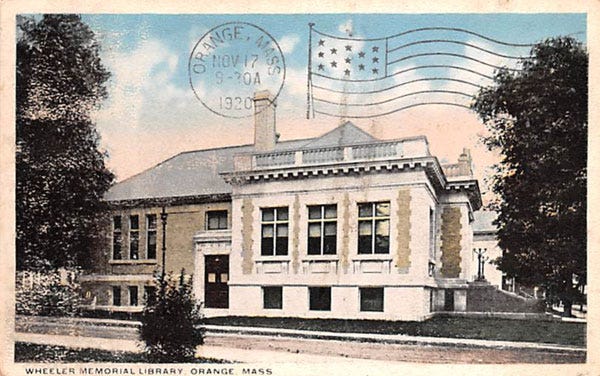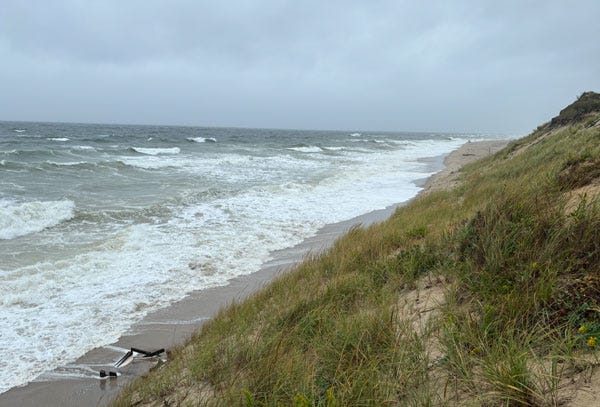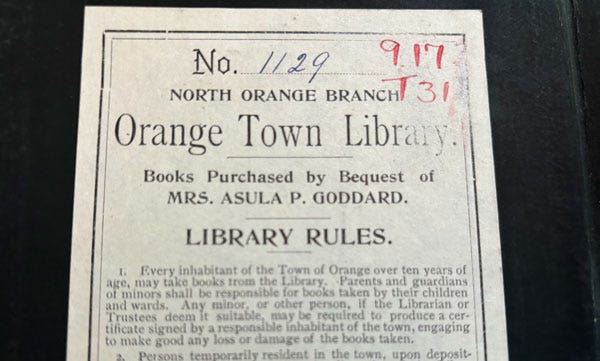Wednesday Walk: Thinking of the Refugees
People are getting displaced by climate catastrophe and war, evaluating the election through the lens of racism, and an old library with an even older book
Welcome to Willoughby Hills!
Every Wednesday, I offer a few short ideas that I hope will inspire you to do some more reading, thinking, and exploring. Let’s take a little walk together and see where the path leads…
The Coming Refugee Crisis
Last week in this column, I shared some of my thoughts after having visited and worked in several areas hit hard by hurricanes over the years. That was written in response to Hurricane Helene and the devastation caused throughout Appalachia.
It’s mindblowing to think as I’m writing this, Hurricane Milton is growing and is poised to do some major damage when it makes landfall in Florida.
I’ve been reaching out to any friends and family in the forecasted areas and checking in. Some have evacuated, others are riding out the storm in place.
While I think it’s prudent to heed evacuation orders, I can also understand the impulse to stay. Even in times where we’re completely helpless, there’s always the sense that somehow our presence can solve something. If we’re there when a window breaks, perhaps we could somehow repair it to keep the roof from blowing off, for example. There’s a loss of control that comes from walking away, coupled with days of anxiety waiting to return and see what remains. I honestly don’t know what I would do were I faced with this choice.

As the highways line with people headed north away from the storm, I can’t help but think about how we are going to deal with the continued and massive displacement of large groups of people.
As these back to back storms seem to show, extreme weather events are the new normal and nowhere is truly safe. If Asheville and the surrounding area, half a mile above sea level and hundreds of miles from the coast, can feel the effects of a hurricane, we are all at risk.
But displacement will also continue to come from famine, droughts, and war all around the world.
That latter one is especially on my mind as I just recorded an incredible conversation with Farah Assi, which will release as my next podcast episode later this week. Farah was born in Southern Lebanon in 1982, during the Israeli occupation. Her family fled to Canada as refugees in 1986, only to return to a still occupied Lebanon a decade later.
Farah shares some gut wrenching stories about what it was like to have to leave her home country because of war and violence, the challenges of settling in a new place, and the longing that she still has to return to Lebanon, even after 24 years of living in the United States and raising a family here. Her father and many aunts and uncles remain in Lebanon, and they are currently witnessing the Israeli bombings not far from their homes.
That episode will go live on Thursday morning and it’s a powerful one worth a listen.
As a reminder, paying members not only help support this newsletter, but they also get early access to the podcast (the link for this upcoming episode will be sent later today). If you’re in a position to be able to help sustain this project, please upgrade your membership to contribute.
A special shout out to Patric and Brian for recently upgrading to paid subscribers. One of them told me they thought they had been for a while and didn’t realize they weren’t! So it’s a good reminder to double check.
My hope is that Hurricane Milton’s destruction is minor, that the people riding the storm out locally remain safe, and that the evacuees have homes to come back to.
In Praise of Cape Cod and Libraries
Last month, I chaperoned my daughter’s school trip to Cape Cod. Along with six other adults, I spent four days camping out, hiking through salt marches, whale watching, and tending to 22 sixth graders.
I am no stranger to Cape Cod, having visited at least once per year over the last decade or so. Oftentimes, my trips involve some beach time, but also a good mix of enjoying the more commercial (some might say “honky tonk”) side of the Cape: roadside lobster stands, boutiques featuring homemade goods, drive-in movie theaters.
But this trip was special because it was entirely based on nature. Aside from one emergency trip to the grocery store to pickup extra food for the class and an impromptu visit to the laundromat to dry the students’ rain-soaked clothes (both completed by myself with no students in tow), the rest of our time on the Cape was spent fully absorbing nature.
We hiked through salt marshes, where the coastal grasses and layers of peat sequester more carbon from our atmosphere than a dense forest (who knew?!). We stopped at an Atlantic beach at high tide during a full moon and saw the raw power and fury of the waves (the sixth graders turned almost primal at this, howling and cheering at the waves as they eroded the beach below).
After returning home, I was newly inspired by being in the “natural” side of the Cape and wanted to do more reading about it. I learned that Henry David Thoreau also used to travel to Cape Cod and that he published a series of essays documenting his trips in the mid 1800s. I immediately requested the collection of his work from that time from the local library.
When the book was delivered, the librarian remarked at how old it looked. It was bound in green with Thoreau’s signature in gold lettering on the front. If there ever was a dust jacket, it hadn’t survived at this point.
This particular copy that I am now reading is the fourteenth edition, printed in 1887 by Houghton, Mifflin and Company! And it’s still in circulation from the local library.
On the inside cover, there’s a plaque glued inside which states that this book was purchased by Mrs. Asula P. Goddard for the North Orange Branch of the Orange Town Library. It also includes the library rules.
Here are a few of my favorites:
Every inhabitant of the Town of Orange over ten years of age, may take books from the Library. Parents and guardians of minors shall be responsible for books taken by their children and wards Any minor, or other person, if the Librarian or Trustees deem it suitable, may be required to produce a certificate signed by a responsible inhabitant of the town, engaging to make good any loss or damage of the books taken.
Persons temporarily resident in the town, upon depositing one dollar, may be allowed, in the discretion of the Librarian, to take books out on the usual conditions; upon return of book, the money to be repaid.
The only mode of obtaining a book, will be by the presentation of a card… One book may be taken at a time, and kept four weeks, but recent additions may be limited to a circulation of one week, at the discretion of the Trustees, without renewal. Cards may be obtained of the Librarian for one cent each.
Imagine a time where there was a cost for a library card, even if only one cent!
This book was transferred from to my library from the Wheeler Memorial Library in Orange, MA, a beautiful historic building.
Ironically, the Thoreau book is actually older than that library itself, as the library opened in 1914. It was a gift of lmira Wheeler Thompson, named to honor her late husband, John W. Wheeler, who was the president of the New Home Sewing Machine Company.

Orange was once a major industrial town in North-Central Massachusetts, home to both the New Home Sewing Machine Company and the Minute Tapioca factory. Families like the Wheelers were once able to fund incredible public works that would be unthinkable now. These days, the town has been hit with hard times, as most of the industry pulled out decades ago, leaving a hallowed out population and a dying downtown.
Ironically, as Orange’s population has shrunk, its library has also fallen on hard times. Earlier this year, the town set the library budget at zero dollars and it seemed the two libraries in town may have had to close. They were saved, but barely.
(Side note: I’ve actually been reading an amazing book about efforts to start a co-op grocery store in Orange as a means of economic revival and an outlet for local farmers. The book ended up getting deep into the history of the city itself, America’s industrialization, colonialism around the world, and how the plantation model informed our industrial food system and continues to dominate, even after the outlawing of slavery.
The book is Food Margins: Lessons from an Unlikely Grocer by antropologist Cathy Stanton. If you’re interested in the joys and challenges of building a local food system, it’s a really good read!)
It’s wild to imagine a time more than a century ago when a small town like Orange had a thriving local economy and enough money to properly support two libraries. It’s even stranger to imagine a town without a library.
Against that context, it’s a wonder that this Thoreau book has survived as long as it has, making reading it all the more special.
The Low Expectations of White Men
I’ve been writing a lot about the upcoming presidential election lately. I know that most readers are probably firmly decided, but I think it’s worth considering the nuance and difficulty of the two major candidates.
I have been critical of Vice President Harris in this newsletter, especially her continued support of Israel. I have made the case for her to pivot on this issue, encouraged those of us who care about this issue to continue to push her on it, and chosen to withhold my endorsement (and possibly my vote) if she’s still committed to funding the Israeli war machine.
A contradiction that I’ve had to wrestle with over these last few weeks since she became the presumptive and then confirmed nominee is whether or not my critiques of Harris play into racist or sexist assumptions. Her being a Black and South Asian woman is not the reason I have been critical of her policies, but perhaps her identity is one of the reasons that I think she’s movable on these issues.
I think my critique of Harris is rooted less in direct sexist or racist feelings towards her, but speak more to how racism and sexism affect how we view white men in this country.
It’s no secret that women, people of color, and especially women of color are held to a different standard than white men. This happens everyday in corporate America, academia, and politics.
Yes, the Uncommitted movement and other activists tried to push Biden on the issues around Israel this past spring, but I think those efforts were done knowing that he was unlikely to change. A few months ago, it seemed inevitable that we were stuck with two old white men who would basically do whatever they wanted to destroy our planet and its inhabitants with little repercussion or accountability.
We accept mediocrity from old white men and refuse to ever raise that bar or challenge them to do better.
Do we really think of all of the leaders in our country that the best we can put forward over the last several years is Mitt Romney? Jeb Bush? Joe Biden? Chuck Schumer? Donald Trump for goodness sake?!
Yet anytime a woman, especially a woman of color, rises in the ranks at all, she is immediately the subject of criticism and held to a much higher standard. We expect AOC, Rashida Tlaib, and Ilhan Omar to solve our problems, while letting mediocre white men like J.D. Vance or Matt Gaetz collect our tax dollar funded paychecks while giving very little in return.
So yes, I am holding Kamala Harris to account for her policies, but I’m also realizing that we need to be applying that same standard to all of our politicians, even the old white men that have been in Congress for four or five decades.
It’s not racist or sexist to ask for more from a Black and South Asian female presidential candidate. But it is racist and sexist to not demand the same from everyone else.
I publish new issues every Wednesday and Sunday. Sign up to always receive the latest issue and support my work:
Other Wednesday Walks
If you’ve missed past issues of this newsletter, they are available to read here.







